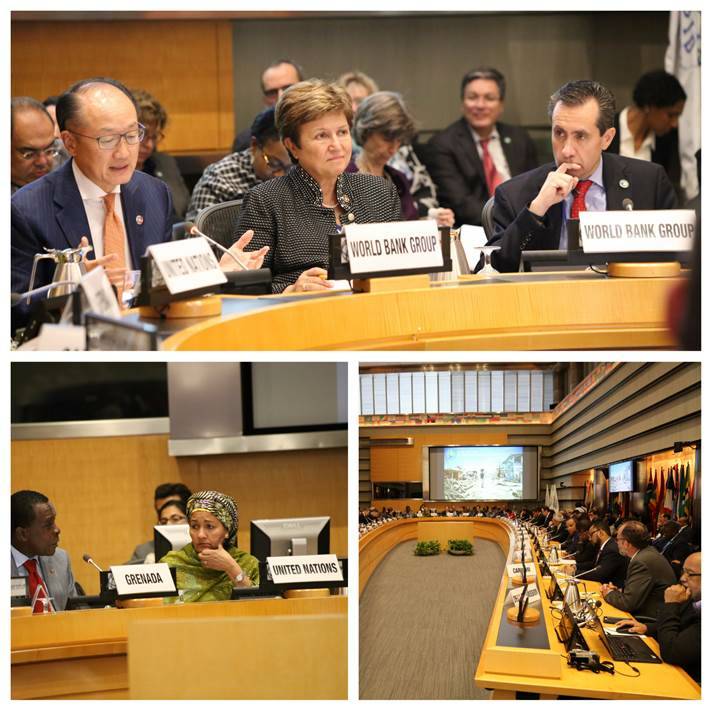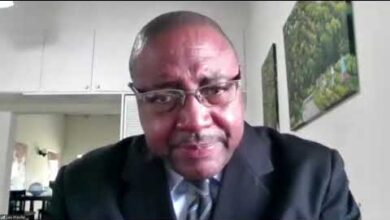Statement on High Level Meeting on Recovery and Resilience in the Caribbean
Washington, October 13th, 2017– Leaders and representatives of CARICOM countries and territories, and international partners, including the international financial institutions, and the representatives of territories in the region, convened (Friday) in a high-level round table on recovery and resilience in the Caribbean hosted by the World Bank Group (WBG), as part of the WBG-IMF Annual Meetings.
During the discussion, participants examined the impact of and recovery from the destructive hurricanes that struck the Caribbean in September, reviewed the instruments available for disaster risk management and response, and considered the need to innovate further in order to address the long-term challenges and strengthen resilience of affected islands.
Participants expressed solidarity and support to the affected islands and communities, and reaffirmed their commitment to working together to build back better and in a more resilient way, following the devastation caused by hurricanes Irma and Maria. They highlighted the need to ensure active engagement of communities, especially women, in the recovery and reconstruction process, as well as the importance of putting in place building standards that will mitigate the impact of future extreme weather events. The participants also noted the importance of making progress on the World Bank’s Small States Roadmap which proposes various initiatives to promote resilience of small states.
The participants highlighted the need for a response involving all partners, including regional organizations, development partners, private sector, national Governments and civil society, to leverage comparative advantages for building resilience to disasters in highly vulnerable small-island states, as extreme weather events have added to their existing economic vulnerabilities. The contribution of the private sector will also be critical, offering both resources and expertise.
While the damage and recovery needs assessment is ongoing, early estimates point to extremely high economic, infrastructure and livelihood impacts of the two hurricanes across many of the affected islands. More than two million people were affected, with near total damage in the worst affected areas.
The participants acknowledged the international partners’ commitment to addressing long-term recovery and resilience needs, as demonstrated by the continuous evolution of the available disaster risk management and response framework. A framework that currently includes tools for risk reduction, preparedness, reconstruction and recovery, as well as risk finance and insurance. For example, in the aftermath of hurricanes Irma and Maria, the Caribbean Catastrophe Risk Insurance Facility (CCRIF), made payouts totaling US$48.6 million to affected members for immediate relief and recovery needs. This shows that global collaboration on risk finance and insurance can provide quick and reliable financial support specifically for poor and vulnerable populations.
The International Finance Institutions (IFIs) also recognized need to continue enhancing their crisis preparedness and resilience framework and toolkit, including through exploring opportunities for multi-country risk management –such as Catastrophe Bonds (CAT bonds) and insurance solutions and extending advisory services across the Caribbean countries and Overseas Territories. The IFIs remain committed to ensuring that post-disaster responses and approaches are tailored to specific country needs to better prepare for and mitigate the impact of future disasters. In addition to their existing initiatives, such as the World Bank Group’s disaster reduction program, the Fund’s rapid credit facilities, and the Caribbean Development Bank’s investments in climate resilient infrastructure, the work of all institutions with at-risk countries in the Caribbean will be deepened to help build stronger macro-fiscal foundations and economic resilience.
All participants acknowledged the importance of global collaboration on recovery, resilience, risk finance and insurance for poor and vulnerable populations in the face of climate and disaster risk and agreed on the importance of continuing this critical discussion including at upcoming high level events in 2017. (World Bank Press Release)






